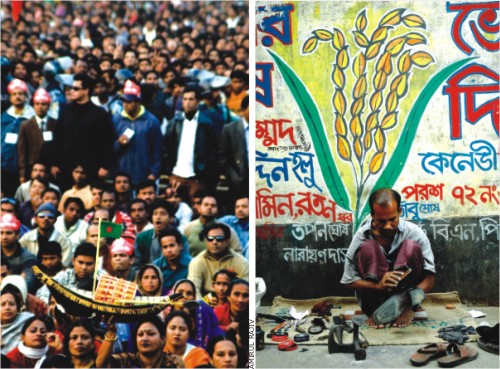
Inside
|
Why are we so loyal to AL and BNP ? Zahin Hasan looks into the hold the big two parties have over the nation
It is generally accepted that BNP and Awami League (AL) are corrupt. We also know that these parties enjoy a lot of popular support. Some political commentators make the implicit assumption that ordinary Bangladeshi voters must be fools to support corrupt parties. I do not accept this assumption. My opinion is these powerful (though corrupt) parties are successfully fostering loyalty by rewarding it with concrete benefits. First, consider what makes BNP and AL special: they are the only national political parties with active membership in every locality (thana and union). Local party members have two key functions in our political system: (1) to collect chanda (political contributions) from businesses in their area, and (2) to intimidate businesses so that only supporters of their own party will be hired. Both of these functions are accomplished through the threat of violence by mastans (party thugs). Let's look at the situation on the ground a little more closely. Suppose you are an entrepreneur opening a business in a village or small town. You will be periodically approached by a local leader (probably a member of the local union porishod) for chanda. You will also be asked to hire job applicants recommended by him (as workers). Obviously, they will only recommend loyal supporters of their own party. If you do not pay chanda, the local leader will employ mastans to damage your property or intimidate your employees; in extreme cases, mastans may even force businesses to close. However, the amount of chanda is negotiable. Every time you hire one of the local leader's supporters, you buy yourself a bargaining chip; it is difficult for him to demand a large amount of chanda if you are providing employment to many of his supporters. Suppose now that there are several local leaders, and each has recommended many of his supporters (this is more realistic). Suppose that there are also many politically unaffiliated job applicants who are not recommended by any political leader. The more politically affiliated workers you employ, the less chanda you pay. So as an entrepreneur, you would be foolish to hire very many of the unaffiliated job-seekers. And job seekers will quickly learn that loyalty to a BNP or AL can get them a leader's recommendation, which improves their chance of being hired. Individual voters are not stupid. They can see that political parties employ criminals (mastans). In their view, however, local leaders and their mastans resemble Robin Hood and his Merry Men, preying on the wealthy (entrepreneurs) and creating benefits for the poor (unemployed party supporters). In this environment, any unemployed young person would be foolish not to support BNP or AL; such support may be rewarded with a job, or at least with a small share of the chanda collected. Why do clean parties like Gono Forum do poorly in elections? I think it is because people who have "invested" years of support in BNP or AL will not suddenly desert their party. To most voters, concepts such as good governance are abstract, whereas the rewards of loyalty to BNP or AL are much more concrete. Many voters desire clean and effective government less than they desire the benefits of loyalty to BNP or AL (especially if that benefit is a job).
Almost everyone recognizes today that old-school socialism -- nationalized industry -- is a recipe for economic stagnation. Profitable companies expand and create more employment; state-owned companies are never profitable, and never create more employment. Why is it that state-owned companies are never profitable? In Bangladesh, at least one reason is that they all have far more workers than they need. Excess workers have been hired over the years under pressure from whichever party was in power. Though the losses of state-owned companies are a drain on the treasury, they have fostered support for BNP and AL by employing so many of their supporters. This is why political parties want to keep state-owned companies the way they are: over-staffed and in the red. There is no easy way out of this. If BNP and AL are successfully rewarding loyalty, most voters will be loyal to them. Basic needs -- food and shelter -- can only be met if people have income. The need for good governance is not a basic need; poor people who are worried about food and shelter will vote for a party which can use influence -- even threat of violence -- to get them a job, not for a party which promises good governance. Zahin Hasan is a businessman.
|

